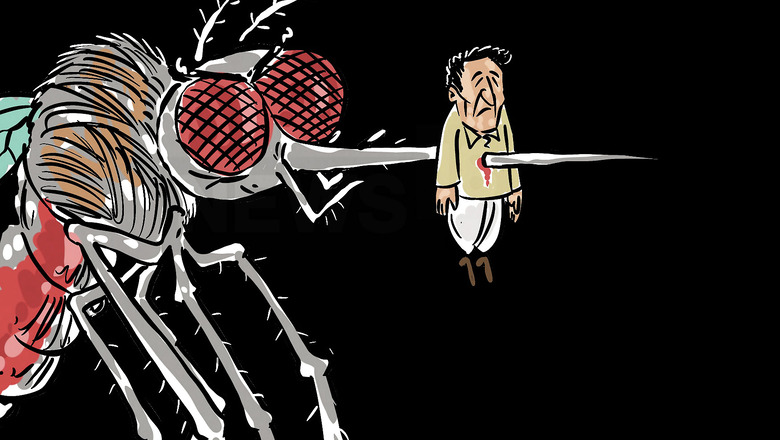
views
Dengue or dengue fever is a mosquito-borne viral infection causing a severe flu-like illness that sometimes may cause potentially lethal complication called severe dengue. The monsoon disease is caused during the rains as the mosquito – Aedes aegypti that is the main vector – breeds in stagnant water. According to the World Health Organization (WHO), the dengue virus (DEN) comprises four distinct serotypes (DEN-1, DEN-2, DEN-3 and DEN-4) which belongs to the genus Flavivirus, family Flaviviridae. Among them, “Asian” genotypes of DEN-2 and DEN-3 are frequently associated with severe disease accompanying secondary dengue infections. Other prevalent mosquito-borne diseases during monsoon include malaria and chikungunya.
The Aedes aegypti mosquito transmits the virus that causes dengue. The viruses are passed on to humans through the bites of an infective female Aedes mosquito, which mainly acquires the virus while feeding on the blood of an infected person.
Dengue fever virus (DENV) is an RNA virus of the family Flaviviridae; genus Flavivirus.
The dengue mosquito bites during the early morning and in the evening. The platelet count of the person infected with dengue drops if precaution is not taken soon after being diagnosed. At times the symptoms like rash, high fever, headache, vomiting, muscle and joint pains are neglected and it turns severe.
Severe dengue (previously known as dengue haemorrhagic fever) was first recognised in the 1950s during dengue epidemics in the Philippines and Thailand.
Common names for dengue fever include breakbone fever and dandy fever. Dengue hemorrhagic fever and dengue shock syndrome are the severe forms of the disease. People with low immunity should be more careful as dengue virus can affect anyone who are exposed to infected mosquitoes. The incubation period is 3 to 14 days, while the period of the illness is 3–7 days.
Dengue has become a global problem since the World War II and is common in more than 110 countries, mainly in Asia and South America.
Not just by the bite of mosquito, dengue can also be transmitted via infected blood products and through organ donation. While there is no specific treatment for dengue virus till date. Early diagnosis is important to reduce the risk of complications and avoid further spread of dengue virus.
If a person sees any of the symptoms, he/she must visit to a doctor or a hospital immediately. Proper rest, healthy lifestyle, intake of plenty of fluids, medication to reduce fever, such as paracetamol (avoid aspirin as it has blood-thinning properties) should be followed.
Prevention from dengue is possible, a person can restrict onself from falling prey to dengue by wearing full-sleeves clothes while stepping out of house, using mosquito repellant and mosquito nets, avoid accumulation or stagnation of water in vicinity.
Read all the Latest News, Breaking News and Coronavirus News here




















Comments
0 comment